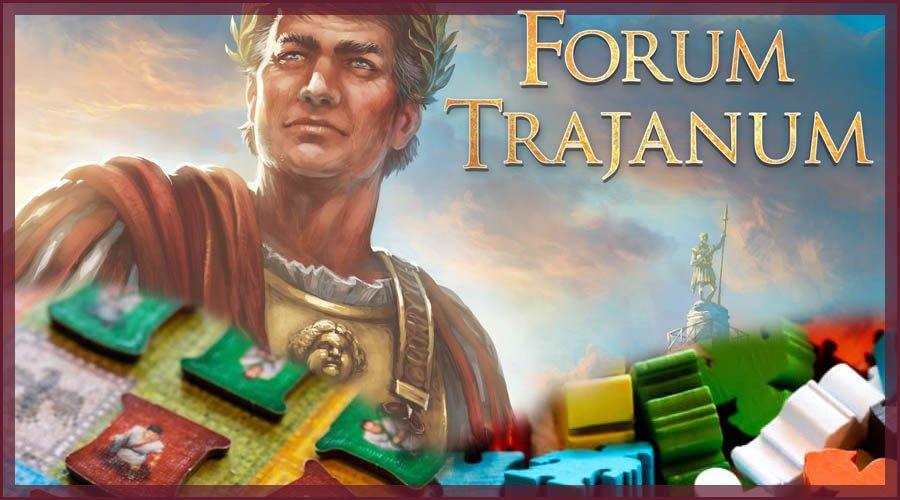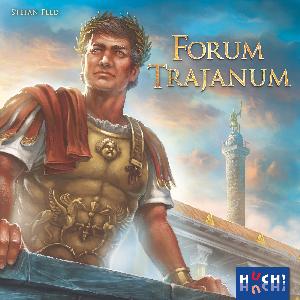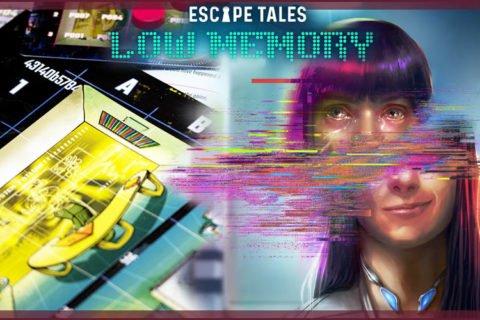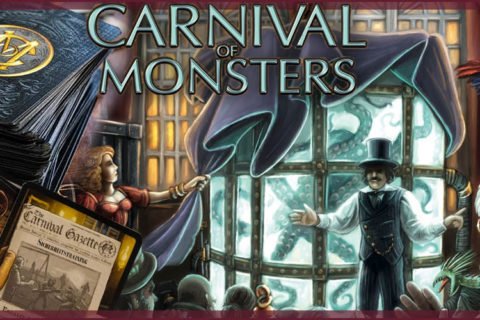Forum Trajanum – Yet another Roman board game
 The streets of Colonia Ulipia Trajana run in beautiful straight lines. The Teutons are no longer a threat. Quite the contrary, they arranged themselves with life and also with the prosperity that can now be felt everywhere. You could almost think you are back home in the capital of our empire. But unlike Rome, there are not so many people here far to the north. And also the gorgeous buildings as the Colosseum or the Forum Romanum are missing here, of course. But slowly, also here in the Colonia Ulipia Trajana a gorgeous city is developing that does not have to hide behind Rome. And who knows, maybe our Trajan Column will become as magnificent here as its great original in the middle of the Forum Trajanum. Only time will tell, but the signs are good.
The streets of Colonia Ulipia Trajana run in beautiful straight lines. The Teutons are no longer a threat. Quite the contrary, they arranged themselves with life and also with the prosperity that can now be felt everywhere. You could almost think you are back home in the capital of our empire. But unlike Rome, there are not so many people here far to the north. And also the gorgeous buildings as the Colosseum or the Forum Romanum are missing here, of course. But slowly, also here in the Colonia Ulipia Trajana a gorgeous city is developing that does not have to hide behind Rome. And who knows, maybe our Trajan Column will become as magnificent here as its great original in the middle of the Forum Trajanum. Only time will tell, but the signs are good.
A forum in Roman times was the legal, cultural and economic centre of a city. And this is exactly what the board game Forum Trajanum by Stefan Feld is about. As the administrator of a small colony you not only build up your small town, you also send delegates to Rome in return to gain influence there. For expanding the colonia and gaining influence you will receive victory points and whoever has the most at the end of the game will be a true Roman board game lord.
Ave Forum Trajanum
We are building a city! A quite popular and already often used theme in board games. Our setting is the old Rome, or rather the old Rome at the time of Emperor Trajan. During his time in power, Trajan had been very aggressive in promoting the construction of cities, so-called Colonias, because he saw the cities as the lowest administrative element and a support for the Roman Empire. But enough about history.
As already described you are building a colonia. But it’s not quite that simple. First of all, you need builders, which you get by uncovering hidden tiles that are lying on your tableau. You can’t really choose freely, because there are two cards per round, which determine from which row or column you can take the tiles. You can keep one tile and pass the other to your left neighbour. All players do this at the same time, so you have exactly two tiles at the end of that phase.
This will give you builders or money. You can then exchange the builders for buildings and build your city in the exact place where you made room before. At the same time, you can send the tokens you remove from your colony to Rome to gain influence, which is important for the intermediate scoring. You do this 12 times in total, with an intermediate score every 4 rounds. In this sense Forum Trajanum is a quite simple board game. Uncover, trade and send delegates to Rome.
It is collecting that turns a simple game into an upscale expert game. As already mentioned, there is an intermediate scoring after every 4 rounds. And this intermediate scoring is really something special. In a total of 4 categories you can earn victory points and of course you have to decide early on how you want to earn the points, because the individual categories may be excluded from each other.
For example, you score the colored houses of your Colonia, but you can only do this color scoring once per color in the whole game. So do you score these houses at the beginning, where there are more points per house, or do you score them later, where there are less points per house, but you simply have more houses? And do you want to build the coloured houses at all, as they take away valuable building space and are only scored once, while the citizens of your town are scored each time you build them, if you have the right buildings in the town. This way the scoring mechanisms work wonderfully together. What you have too much in one place, you will miss in another. Thinking-Player I can hear you brooding!

A reverse explanation
No question, Forum Trajanum is one of those board games that you should actually explain in reverse order. Right after the game is set up, you should explain to new players how they can score. Otherwise it can happen very quickly that in the first scoring, players are penalized with 0 points because they did not have the victory conditions in mind. This makes it complicated, so it’s not surprising that we concentrated on one category in our games until we understood the different scoring levels. Then we started to look at a second one and so on and so on.
Unfortunately, this is of course a high barrier to getting started and discourages some people. The rule book is not helpful either. All steps are described, but in some places it seems vague and poorly structured. Again and again you will be referred to other pages where there are comments to your questions or examples do not explain 100% what is meant. It explains how to play the road cards, but unfortunately in the example two roads are drawn, each with a row and a column. So the first time you draw cards that both describe a column, you will look surprised. – And yes, it is allowed – but unfortunately this is not the only case. Because of the complicated written rules you turn the pages quite often at the beginning and the fun of the game is reduced.
But Forum Trajanum is not difficult. In my eyes it is a classic Stefan Feld: A simple mechanism is taken and spiced up once again. This way it plays fast and the downtime is felt to be quite low, which is also due to the fact that everyone is busy at the beginning of the round to think about which tile to give away or not. It can happen that you change your mind as soon as you get the tile from your neighbour, but this is also quite fast. You only have to choose one tile out of two. On top of that, you can also manipulate your choices and placement options with different actions during your turn. Just a classic Feld.
The difficulty here clearly is in the scoring. This is where most of the thinking happens. When do I use what? And everything fits together nicely: Up to now I didn’t have the feeling that a strategy here is particularly profitable. You have to focus on all categories and not ignore any of them. Much more important is the timing, when I decide to score the important points.
But to get that far you have to give Forum Trajanum time and let it develop.

The better board game in the ancient Rome
Of course, in retrospect, besides Forum Trajanum, you must also look at Carpe Diem, because there are two board games with the same theme and by the same author, but published by different companies. So of course the first thing that stands out is the graphic implementation. Here Forum Trajanum clearly is way out in front of Carpe Diem. Michael Menzel is responsible for the illustrations and thus captures a little bit of the Roman spirit of that time.
The game materials are also more valuable and well thought out. While Carpe Diem has the tiresome point cards, the board game from HUCH! has a scoring bar. Also the haptic is better than with the competitor. It simply feels more valuable.
In addition, it is also positive that in Forum Trajanum the Roman theme is better implemented than is the case with Carpe Diem. As far as you can speak of a really themed board game at an Eurogame and especially at a Feld. Because if you turn the pages a little bit further, you’ll also be given a short history excursion, which also gives the individual game elements a corresponding depth. You’ll learn that it’s not just a chessboard-like tableau, but that it also makes sense historically. Of course the theme of the board game remains interchangeable, the publisher could have used Vikings or Natives instead of Romans, no question. But exactly this little bit of history makes the topic simply more real. And that’s definitely something I would like to see in other games as well.
Well, and in the end all that remains is the feeling of the game and even if it doesn’t look like that at first glance, the two games are more similar than expected. In both games the pure turn of the player is quite fast and uncomplicated. In both games the focus is on the scoring. And the scoring is not without its problems in Carpe Diem either, because I have to see how I manage my tableau and resources to get high points.

The minor differences
The bottom line is that there are big differences and it starts with the scoring. With Carpe Diem my scoring plan can be spoiled by the other players, depending on when it’s my turn to choose the unique scores. This can’t happen to me at Forum Trajanum, here I am my own little point smith. In addition, Forum Trajanum feels more tactically controllable. I can make more decisions about which tiles to play and how to play them. Do I prefer to expand my colonia with citizens or do I build buildings and send my delegates to Rome to win over majorities? That makes it more difficult and challenging, but for me, this is where the appeal lies.
With Carpe Diem I don’t have to think so much, because I can let myself be driven by the game. But I just have to trust in my luck: If the tiles that bring me something are still on the table, won’t my opponent take away the scoring from under my nose? This makes it easier to learn, but it can also be more frustrating.
The die is cast
I enjoy playing Forum Trajanum, even if the rules or the rule book are a bit daunting at first. After that I build and draft around the bet and then I am annoyed from time to time about the tile, which I got from the other player, because then I have to change my decision again. And then there’s this little voice in the back of my head that asks: “When your team mate gives away a tile like this, what does he hold in his hand?
In addition, everyone at some point realizes that the move he made three rounds ago will cost him the victory. Even bloggers who are writing are not afraid of such things. But this is an incentive to build up his colonia better next time. Of course, these are mistakes that only happen in the first few games and with time they will be fixed. And so at some point I concentrate on not getting quick cheap points, but on building up something that will earn me a good amount of points in the end.

But whether you’ll get this far at all, is also dependent on whether you’ll get the same tiles again. For me it is a wonderful trick in setting up the game that you always have all the tiles. If you get the tiles you need, however, depends on luck.
Nevertheless, what I am not concerned about is the luck or bad luck when pulling the plates. I can roughly estimate which street cards will be drawn during the course of the game, but since my tokens are flipped, I can’t see what bonus I’ll get. This can result in me being very limited in my possible actions for a few rounds in a row.
I like the visual design, it captures the theme better than other board games with the same theme. Even the column, which serves as a point reminder and round counter, and grows further and further into the ‘sky’ during the game, supports this, even if it’s only a small gimmick.




Leave a Reply